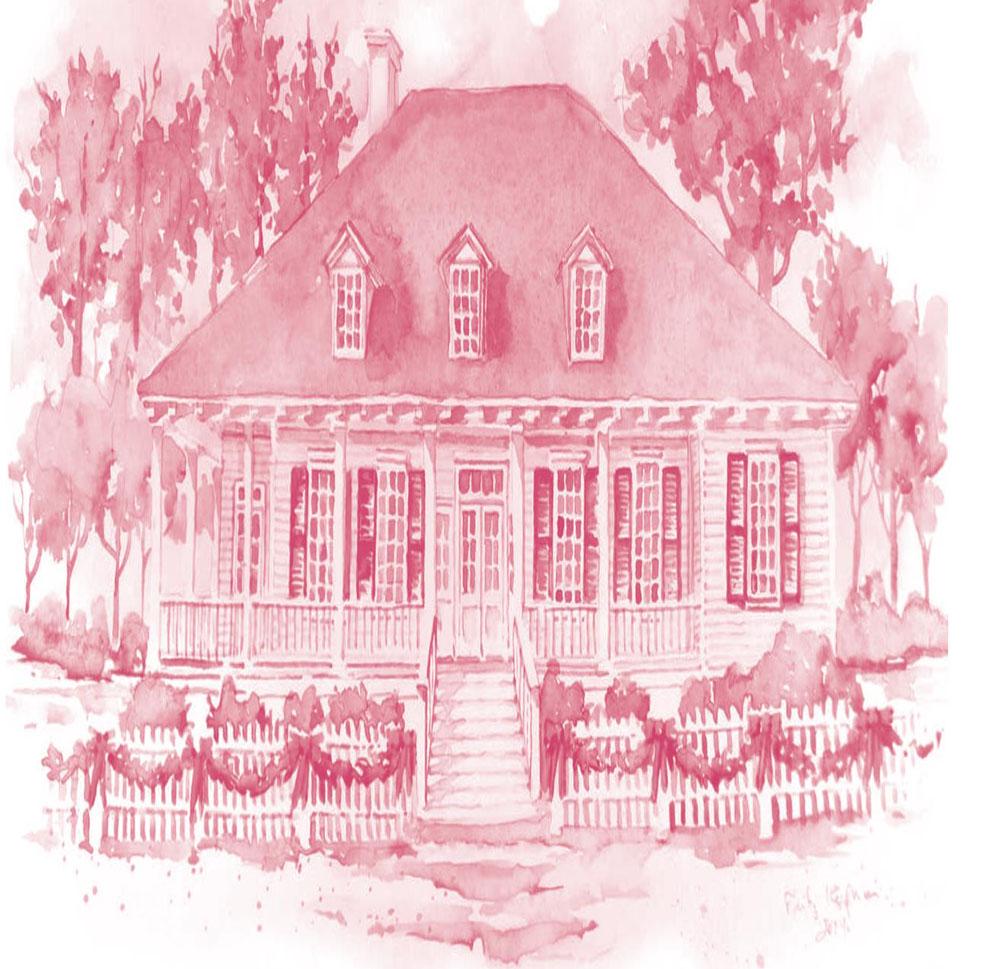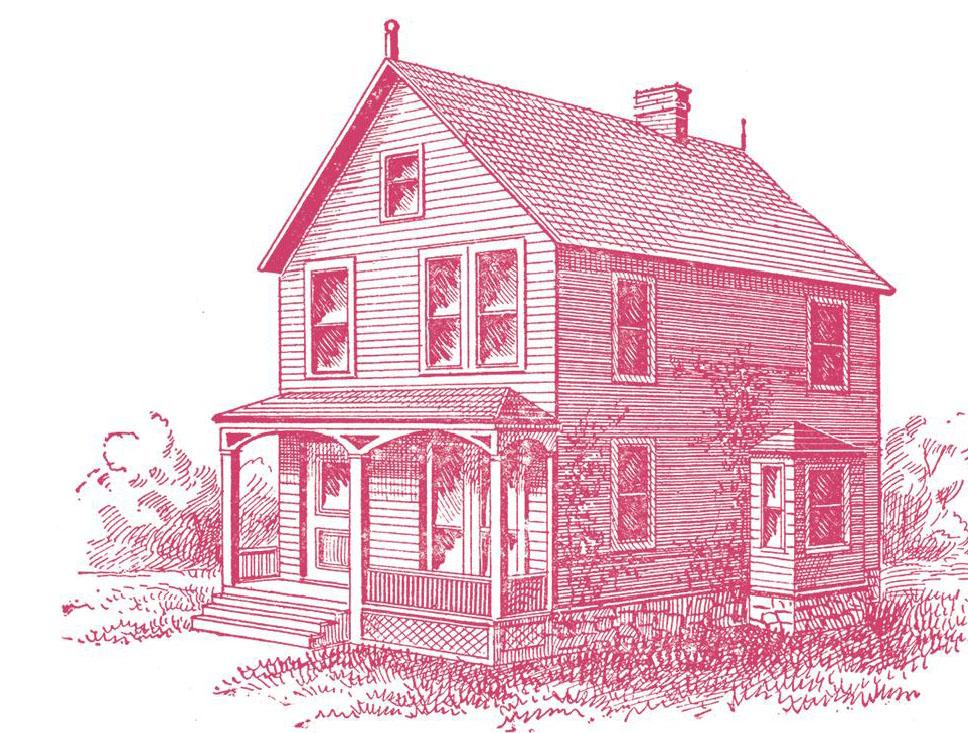家
格温德琳·布鲁克斯



What had been wanted was this always, this always to last, the talking softly on this porch, with the snake plant2 in the jardinière3 in the southwest corner, and the obstinate4 slip from Aunt Eppies magnificent Michigan fern5 at the left side of the friendly door.
Mama, Maud Martha, and Helen rocked slowly in their rocking chairs, and looked at the late afternoon light on the lawn and at the emphatic6 iron of the fence and at the poplar tree. These things might soon be theirs no longer. Those shafts7 and pools of light, the tree, the graceful iron, might soon be viewed passively by different eyes.
Papa was to have gone that noon, during his lunch hour, to the office of the Home Owners Loan. If he had not succeeded in getting another extension, they would be leaving this house in which they had lived for more than fourteen years. There was little hope. The Home Owners Loan was hard. They sat, making their plans.
“Well be moving into a nice flat somewhere,” said Mama. “Somewhere on South Park, or Michigan, or in Washington Park Court8.” Those flats, as the girls and Mama knew well, were burdens on wages twice the size of Papas. This was not mentioned now.
“Theyre much prettier than this old house,” said Helen. “I have friends Id just as soon9 not bring here. And I have other friends that wouldnt come down this far for anything, unless they were in a taxi.”
Yesterday, Maud Martha would have attacked her. Tomorrow she might. Today she said nothing. She merely gazed at a little hopping robin in the tree, her tree, and tried to keep the fronts of her eyes dry.
“Well, I do know,” said Mama, turning her hands over and over, “that Ive been getting tireder and tireder of doing that firing. From October to April, theres firing to be done.”
“But lately weve been helping, Harry and I,” said Maud Martha. “And sometimes in March and April and in October, and even in November, we could build a little fire in the fireplace. Sometimes the weather was just right for that.”
She knew, from the way they looked at her, that this had been a mistake. They did not want to cry.
But she felt that the little line of white, sometimes ridged10 with smoked11 purple, and all that cream-shot saffron12 would never drift across any western sky except that in back of this house. The rain would drum with as sweet a dullness nowhere but here. The birds on South Park were mechanical birds, no better than the poor caught canaries in those “rich” womens sun parlors.
“Its just going to kill Papa!” burst out Maud Martha. “He loves this house! He lives for this house!”
“He lives for us,” said Helen. “Its us he loves. He wouldnt want the house, except for us.”
“And hell have us,” added Mama, “wherever.”
“You know,” Helen sighed, “if you want to know the truth, this is a relief. If this hadnt come up, we would have gone on, just dragged on, hanging out here forever.”
“It might,” allowed Mama, “be an act of God. God may just have reached down and picked up the reins13.”
“Yes,” Maud Martha cracked14 in, “thats what you always say that God knows best.”
Her mother looked at her quickly, decided the statement was not suspect15, looked away.
Helen saw Papa coming. “Theres Papa,” said Helen.
They could not tell a thing from the way Papa was walking. It was that same dear little staccato16 walk, one shoulder down, then the other, then repeat, and repeat.
They watched his progress. He passed the Kennedys, he passed the vacant lot, he passed Mrs. Blakemores. They wanted to hurl themselves over the fence, into the street, and shake the truth out of his collar. He opened his gate—the gate—and still his stride and face told them nothing.
“Hello,” he said.
Mama got up and followed him through the front door. The girls knew better than to go in too.
Presently Mamas head emerged. Her eyes were lamps turned on.
“Its all right,” she exclaimed. “He got it. Its all over. Everything is all right.”
The door slammed shut. Mamas footsteps hurried away.
“I think,” said Helen, rocking rapidly, “I think Ill give a party. I havent given a party since I was eleven. Id like some of my friends to just casually see that were homeowners.”
真想这一刻永远、永远都不要停止。一家人坐在门廊,轻声闲聊,气氛融洽。门廊西南角的花盆里,虎尾兰生机勃勃。家门口左侧种了一根蕨枝,倔强地挺立着,那根枝条是从埃皮姨妈种的一堆漂亮的密西根蕨里剪枝插种的。
妈妈、莫德·玛莎和海伦三人,慢悠悠地摇着各自的摇椅。她们看着洒落草坪的霞光、显眼的铁栅栏和那棵杨树。但这些可能很快就不再属于他们了。这一束束余晖和一片片霞光、那棵杨树和雅致的铁栅栏,在别人眼里可能又是另一番模样。
爸爸中午就出去了。他趁着吃午饭的当口,到业主贷款公司办公室去了。如果他不能再次延长还贷期限,他们家今天就得搬出去。他们已经在这座房子里住了超过14年。延期还贷的希望渺茫,房贷公司可不是那么容易对付的。她们三人坐在一起,聊的就是搬家计划。
“我们将搬到某个地方去住漂亮的公寓。”妈妈说,“要么搬到旧金山的南部公园,要么搬到密西根州的什么地方,要么搬到华盛顿公园街。”姑娘们和妈妈心里都清楚,就算爸爸挣得比现在多一倍,也租不起那些公寓。但此刻这话她们谁也没有说。
“那些公寓可比现在这座老房子漂亮多了。”海伦说道,“有些朋友,我宁愿不带到这儿來。还有些朋友,不打车是绝不会跑这么远过来的。”
要是在昨天,莫德·玛莎一定会驳斥海伦,或许明天也会。但今天她什么也没有说。一只知更鸟在树上跳来跳去,莫德·玛莎只是盯着小鸟和她的那棵树,尽力不让眼泪流下来。
“嗯,这我知道。”妈妈一边说,一边把手心手背翻给两个孩子看,“我越来越讨厌生火了。从今年10月开始,到明年4月,每天都得生火才行。”
“但是,我们最近一直都在帮你啊,哈里和我都在帮你。”莫德·玛莎说,“3月、4月、10月,甚至在11月,壁炉里可以生些小火,有时候天气不是特别冷,生小火刚刚好。”
望着妈妈和海伦看她的眼神,她知道自己说错话了。她们不想哭。
但她意识到,再也看不到有时中间泛着烟熏紫灰色的那一缕白烟了。那一片奶油花般的橘黄色霞云飘过西边天空的景象,也只有在他们家屋后才能看到。或许,也只有在这里,滴滴答答的雨点沉闷却悦耳。而南方公园里那些機械鸟,也不比那些被“富”婆们关在阳光充足的客厅里可怜的金丝雀好到哪里去。
“那一定会要了爸爸的命!”莫德·玛莎突然说,“他爱这座房子!这个家是他的命根子!”
“我们才是他的命根子。”海伦说,“他爱的是我们。如果不是为了我们,他才不会要这座房子呢。”
“没有了房子,他还有我们,”妈妈补充道,“无论在哪儿。”
“知道吗,”海伦叹了一口气,“如果你们想听真话,这或许是种解脱。如果不是贷款到期了的话,我们的生活还将是老样子,我们会永远困在这儿,哪儿都去不了。”
“这有可能,”妈妈表示同意,“就是上帝的安排。上帝可能刚刚伸出手,掌控一切。”
“是啊!”莫德·玛莎声音嘶哑着插嘴,“这不正是你一直挂在嘴边的话吗——上帝知道什么是最好的。”
妈妈急忙瞥了她一眼,觉得这话没错,便扭头看向了别处。
海伦看见爸爸走过来。“爸爸回来了!”她喊道。
她们从爸爸走路的姿态看不出什么来。他还是迈着小步,一步一顿,双肩随着脚步不断地一起一落。
她们看着爸爸一步步走来。他走过肯尼迪家,走过那块空地,走过布莱克摩尔夫人家。她们多想跨过铁栅栏,冲上街,抓着他的领子不停晃动,要他说出真相。他打开他家的门——那扇大门——从他的步态和他的表情上,还是什么都看不出来。
“哈啰。”他问了声好。
妈妈站起来,跟着他进了前门。姑娘们知道,自觉地没有跟进去。
一会儿,妈妈的脑袋伸出门外,她的眼睛炯炯有神。
“没事了。”她向姑娘们宣布,“他办成了,都结束了。一切都好。”
门“砰”一声地关上了。妈妈匆匆离开。
“我想,”海伦一边飞快地晃动摇椅,一边说,“我想办一次聚会。11岁以后,我就一直没有办过聚会了。我想请些朋友来玩,顺便让他们知道我们家有房子。”
(译者单位:绵阳师范学院)

